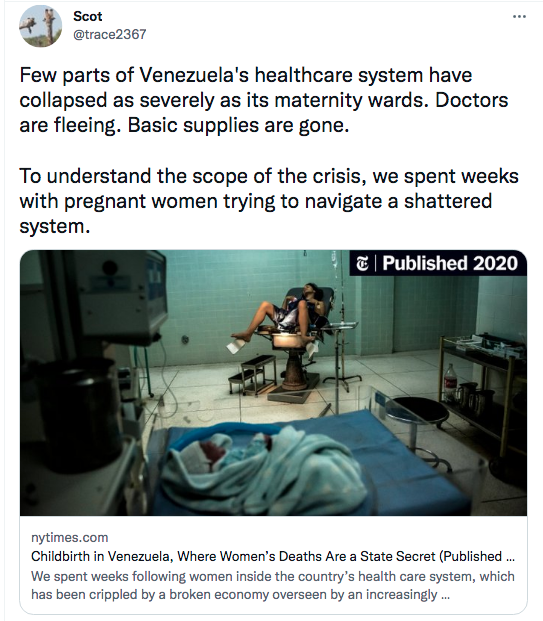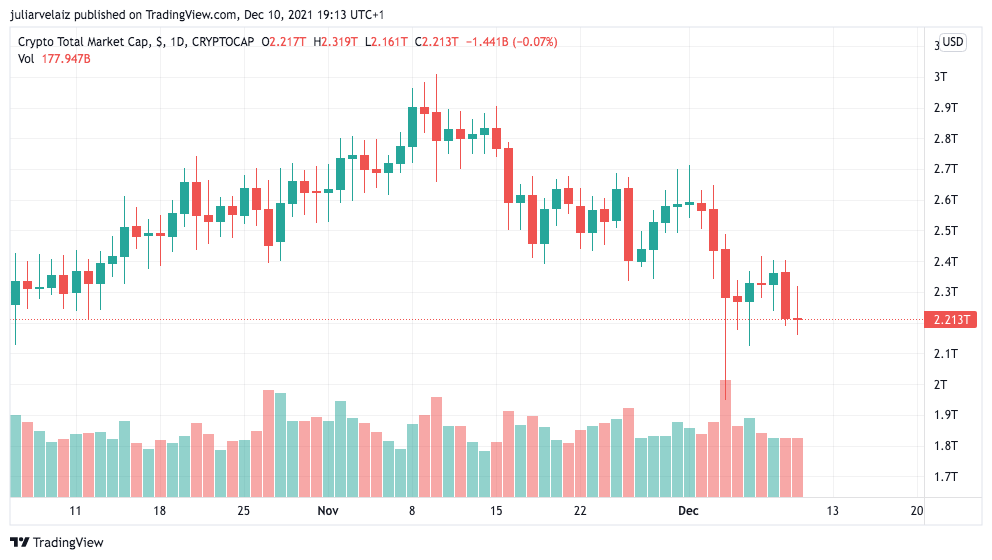
[ad_1]
As Venezuelans have struggled to survive the pandemic during times of dictatorship, the crypto company Circle collaborated last year with the countries’ opposition to financially aid healthcare workers who were abandoned to a broken-down system with almost no proper medical equipment and a discouraging $15 a month salary.
Today $1 equals 45,000,000,000,000,000 bolivars –although it has been devalued to look like 4,5 VES–, a cipher too large to comprehend, much like the general panorama. The basic food basket is calculated over $300 a month, but the minimum wage is roughly $7, and last year many doctors were making as much a $15 a month.
Financial Times published a report where they describe the methods used by the interim president to bypass the Maduro regime’s tight grip that would not allow citizens to receive any type of external aid.
As Gideon Long’s report remembers, the U.S. sanctions on Venezuela had made the situation worse for its citizens with the state funds frozen in U.S bank accounts, but the politicians who oppose the government –with Guaidó recognized by Washington as Venezuela’s legitimate president– found leverage in that by managing to access the accounts after convincing the US Treasury of doing so.
But how would they get the money to the health carers’ hands if the government was extremely against it? Legitimized or not, Venezuela is still under Maduro’s control, so the banks were not a possibility, but stablecoins were. During the bumpy road, the crypto era opened a pathway that wouldn’t have been there a decade ago.
Circle, U.S.–based fintech innovator Airtm and Juan Guaido’s team collaborated in what they claim to be the first “use of stablecoins for foreign aid“, the “only viable option available”.
Circle says on its website: “we were able to put in place an aid disbursement pipeline that leveraged the power of USDC — dollar-backed, open, internet-based digital currency payments — to bypass the controls imposed by Maduro over the domestic financial system and put millions of dollars of funds into the hands of people fighting for the health and safety of the people of Venezuela.”
Maduro’s regime did its best to block the Airtm platform, where healthcare workers would receive the aid, but Guaidó’s team published a guide on how to use the Canadian company TunnelBear’s VPN, which provided free services for a while.
Many countrymen have said that not much changed for Venezuelans either way but at the same, the landmark that collaborations like this ones create show the possibilities that the crypto era we are entering can offer in situations of despair. It’s not all about the market, it’s also about freedom.
Related Reading | Venezuelan Airport To Accept Payment In Bitcoin
Inside The Effects Of Crypto
As the countrymen were already in a heartbreaking situation, the times of Covid came around and Venezuela entered deeper despair. Numbers on deaths cannot be officially traced because the regime covers them up to make itself look better, and all we are left is with the abandoned voices of its victims.

Guillermo Herrera Gallo, a Venezuelan doctor that currently works for the Red Cross in the country, was one of the health workers to receive the bonus. He made comments to newsBTC about his personal experience regarding the financial aid through the decay of Venezuela’s health system.
Herrera said that the aid didn’t make much of a difference for the lives of doctors, but he did see relief in the eyes of nurses who could finally afford a better meal and supplies for their children. He thinks that the method and platform used were strongly beneficial when facing a national currency devaluation that has become useless and was pleased with how secure using AirTM feels like.
Circle adds that this event remarks “the freedom of people to transact, even in the face of brutal dictatorships. It also marks a historic moment where in order to execute on foreign aid objectives, economic and political leaders have turned to stablecoins. ”
Related Reading | How Bitcoin is The Answer To Venezuela’s Stuck-At-Sea Oil Supply

[ad_2]
Source link

